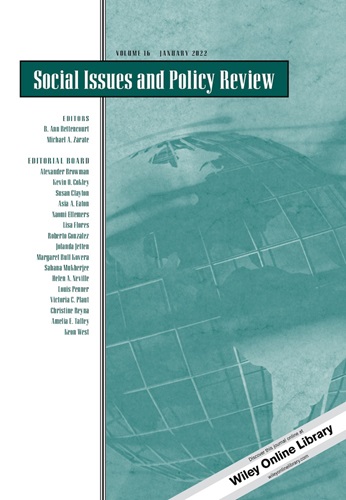接触自信:促进儿童青少年跨群体友谊的新视角
IF 5.6
1区 心理学
Q1 PSYCHOLOGY, SOCIAL
引用次数: 182
摘要
群体间接触理论(Allport, 1954)提出不同社会群体成员之间的积极互动可以改善群体间关系。接触在学校应该特别有效,在那里可能存在与来自不同背景的同龄人合作和发展跨群体友谊的机会。反过来,这些友谊对群体间的关系也有很多好处。然而,有证据表明,儿童并不总是参与跨群体的友谊,经常选择花时间与同组的同龄人,即使在不同的环境。我们认为,为了利用学校接触的潜在影响来促进和谐的群体间关系,需要一种新的模式,将接触的信心置于其核心。我们提出了一个经验驱动的群体间接触理论模型,该模型概述了帮助年轻人“做好接触准备”的条件,通过给他们信心,使他们能够成功地参与接触,为成功、持续的群体间关系做好准备。在评估了学校中传统的群体接触方法之后,我们提出了我们的理论模型,该模型概述了跨群体友谊的预测因素,这些预测因素可以增强对接触的信心和准备。然后,我们讨论理论驱动的、经过实证检验的干预措施,这些干预措施可能会促进接触中的信心。最后,我们对努力促进课堂间和谐关系的实践者和政策制定者提出了具体建议。本文章由计算机程序翻译,如有差异,请以英文原文为准。
Confidence in Contact: A New Perspective on Promoting Cross-Group Friendship Among Children and Adolescents
Intergroup contact theory (Allport, 1954) proposes that positive interactions between members of different social groups can improve intergroup relations. Contact should be especially effective in schools, where opportunities may exist to engage cooperatively with peers from different backgrounds and develop cross-group friendships. In turn, these friendships have numerous benefits for intergroup relations. However, there is evidence that children do not always engage in cross-group friendships, often choosing to spend time with same-group peers, even in diverse settings. We argue that in order to capitalise on the potential impact of contact in schools for promoting harmonious intergroup relations, a new model is needed that places confidence in contact at its heart. We present an empirically-driven theoretical model of intergroup contact that outlines the conditions that help to make young people ‘contact ready’, preparing them for successful, sustained intergroup relationships by giving them the confidence that they can engage in contact successfully. After evaluating the traditional approach to intergroup contact in schools, we present our theoretical model which outlines predictors of cross-group friendships that enhance confidence in and readiness for contact. We then discuss theory-driven, empirically tested interventions that could potentially promote confidence in contact. Finally, we make specific recommendations for practitioners and policy makers striving to promote harmonious intergroup relations in the classroom.
求助全文
通过发布文献求助,成功后即可免费获取论文全文。
去求助
来源期刊

Social Issues and Policy Review
Multiple-
CiteScore
22.20
自引率
1.10%
发文量
9
期刊介绍:
The mission of Social Issues and Policy Review (SIPR) is to provide state of the art and timely theoretical and empirical reviews of topics and programs of research that are directly relevant to understanding and addressing social issues and public policy.Papers will be accessible and relevant to a broad audience and will normally be based on a program of research. Works in SIPR will represent perspectives directly relevant to the psychological study of social issues and public policy. Contributions are expected to be review papers that present a strong scholarly foundation and consider how research and theory can inform social issues and policy or articulate the implication of social issues and public policy for theory and research.
 求助内容:
求助内容: 应助结果提醒方式:
应助结果提醒方式:


